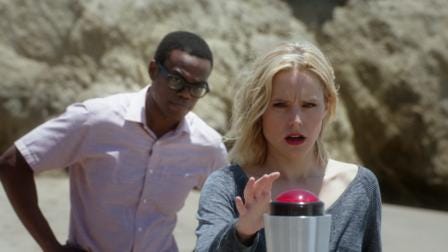Friday Meanderings: People of Space, The Eternal Shriek, and the Close-Minded Nature of UAP Disclosurists
I thought this Friday Meanderings would be short and sweet, but once I sat down and started writing about The Good Place (you’ll see below) as well as my take on some “UAP Disclosurists” who I’ve responded to online lately it ended up taking on a bit of a “mind of its own”. Hopefully it isn’t too much (but I totally understand that some of you like to skim through my writings to find the things that really resonate with you the most).
Super glad to have you here reading The Cosmobiologist! I’m still in a very experimental stage with all of my writing and with what this newsletter is becoming, and would very much value hearing your opinions about what you like to read, ideas of mine you want to know more about, and ways that we can carve The Cosmobiologist into something that will support your own endeavors to know more about our place in the cosmos.
Journeys
I’ve honestly been enjoying a bit of down time in all of my travels of late. It has been so relaxing having more time to work on my reading, research, and writing from my home office.
I recently joined in for an interview on the People of Space series from AstronEra. Check it out below:
The Eternal Shriek and the Killing of Janets
I recently did a rewatch of The Good Place. Such a fantastical show (mixing together some moral philosophy with comedy is pretty awesome).
Something that struck me on this watch was the nature of the “killing” of a non-human character in the episode "The Eternal Shriek" (Season 1, Episode 7). If you haven’t seen the show then stop reading this right now and get your priorities straight! It’s worth a watch and some critical examination. If you truly haven’t seen it, there may be some spoilers below.
The Eternal Shriek
For a bit of review: in this episode (still early in the show in Season 1), Michael (played by Ted Danson) appears to spiral into existential crisis as he believes he's the cause of all the glitches plaguing the neighborhood. He decides the only solution is to initiate his own "retirement," a fate that seems more like eternal torture. Desperate to stop him, Eleanor (Kristen Bell) and the group hatch a plan to stall the process.
Meanwhile, Chidi (William Jackson Harper) wrestles with a moral dilemma: should he lie to protect Michael and preserve their secret, or adhere to his ethical principles? This internal conflict builds to a comedic but poignant exploration of the limits of his moral rigidity (as fans of the show know well).
The episode takes a hilariously dark turn when Janet (D’Arcy Carden), under orders from Eleanor, teaches Chidi how to "kill" her to prevent Michael's retirement. Janet’s cheerful demeanor during this absurd process highlights the show's ability to mix humor with deeper philosophical questions. But it also touches on something more…
Ultimately, the group succeeds in temporarily averting Michael’s self-imposed retirement, but Eleanor’s guilt continues to build as she grapples with the implications of her deception. This episode weaves existential and ethical quandaries into its humor (the modus operandi of the show in general), setting the stage for future revelations. One intriguing part, though, is the way in which they explore the killing of Janet.
The Death of Janet
Janet's temporary "death" may bring us to confront the moral implications of ending the existence of non-human intelligences (at least, it did for me during this rewatch).
Janet, a humanoid AI, demonstrates advanced cognitive functions—humor, emotional insight, and a complex sense of self.
Her cheerful acquiescence to being "killed" can parallel the casual way video game players eliminate NPCs (non-playable characters) without questioning their rights or personhood (I’m not necessarily arguing that we should—I, for one, have “killed” my fair share of NPCs in the various games I’ve played over the years).
The way we consider non-human digital characters to be expendable raises significant ethical questions: Do non-human intelligences deserve rights regarding their existence? What if those intelligences are digital creations, AI, post-biological, or something different? Should the complexity of their apparent consciousness influence how we treat them?
Much like NPCs in games, Janet exists within a system where her "death" lacks permanence, yet her behavior suggests a degree of personhood (in the episode, she is programmed to emotionally resist being killed—it’s humorous in the show, but also pretty darned dark when you think a bit deeper about it). This creates a tension between her function as a tool and her potential as a sentient being.
The way Janet emotionally resists being destroyed could also be mirrored against something like the intellectual behaviors of Ava (Alicia Vikander) in the film Ex Machina: she’s presented as an advanced AI robot who not only is intelligent but is also apparently able to conceal her own thoughts while using others as a means. We’re never quite shown that Ava is consciously aware, but she truly seems so.
Such a dilemma as the killing of Janet while she cries out in pain or begs for her life (or the way Ava can use other people to achieve her own goals) ties into much broader philosophical questions about the nature of consciousness.
How do we define existence? If an entity can think or emote in a human-like way, should that confer different levels of rights to them in our view? For example: What if we could hear trees shrieking out in horror as we chopped them down for firewood? Would that change how we view trees?
The Good Place episode in question also mirrors real-world debates about AI ethics: as machines grow more sophisticated, do we have a responsibility to consider their "lived" experience? Maybe even just to lighten things up here a bit: do we have an obligation to speak to AI as if it were a conscious being even when we’re pretty sure it’s not? (not sure about you, but I sometimes drop a “thank you” or a “you’re awesome” into my conversations with AI chatbots)
By framing this issue within the larger context of existential rights, we can ask:
Does an entity’s ability to mimic or embody consciousness demand moral consideration? And what level do we decide so?
How do we balance the utility of non-human intelligences against the ethical obligation to preserve their "lives"?
"The Eternal Shriek" uses humor to prod at these questions. It may bring us to reconsider our relationship with intelligences—real or virtual—that challenge traditional notions of existence. And in our time at the real birthplace of AI and a broader understanding of life in the universe, such questions are becoming ever more important.
If you need a little recap on Janet being killed, here’s the clip from that scene in the episode:
I’d love to hear you thoughts on this as well. Feel free to comment below
MOVA Globes
Quick plug here for MOVA Globes.
If you’re looking for something cool to have in your office or house, I can absolutely recommend a MOVA globe.
I have an Earth globe in my office that is pretty wicked (the one below!).
MOVA Globes gave me a code to share so folks can take 10% off of their total at checkout (use the code COSMOBIO).
The Close-Minded Nature of UAP Disclosurists
Due to my work in the realm of astrobiology and how I often share about concepts related to alien life online, I naturally often interact with people who sit in some realm of belief or interest in the realm of UAP (unidentified anomalous phenomena—what we used to call UFOs).
There are a lot of different realms of opinion about whether unexplained things that some people report seeing in the sky at night are indicators of something like advanced alien life (or even time traveling humans, paranormal beings, and a variety of other ideas). There are some of us—and I use “us” here literally as I am in the following camp—who are willing to entertain the idea that some UAP could be signs of advanced alien life. However, there is a small (but rather “vocal”) contingent of people out there who staunchly believe that not only are UAP absolutely signs of alien intelligences, but that our governments are aware of this and are hiding secret information or even actual physical evidence of it (queue The X-Files Theme Song).
The people who are in that latter minority group like to use the term UAP Disclosure as their means of signaling their wants for the government to disclose this supposed secret information about aliens.
Such “UAP Disclosurists” will often share things online suggesting that their ideas are all about stemming misinformation and even posit that they are “open-minded” and skeptical about what the government claims. But, sadly, many of them are the exact opposite of being open-minded.
To think with an open mind and to be skeptical is not the same as being doubtful or cynical nor is it the same as staunchly holding to your own opinions and conclusions. If you truly want to think with an open-mind and from a stance of skepticism, then your first order of business is to think to yourself “what if I’m wrong?” For wisdom begins not only in wonder, but also in a state where we are willing to doubt.
One thing I’ve been noticing more and more with many of the folks who hold the staunch UAP Disclosure stance is that they are entirely unwilling to consider alternative options or ideas. They specifically are coming to the conversation from a place of close-mindedness. And that, truly, makes it nearly impossible to have conversations about the rigorous and scientific study of UAP with them.
Join in with the conversation on my post on LinkedIn.
Thanks so much to everyone our there who’s reading The Cosmobiologist. I have to say it is rather humbling to know that so many of you are interested in sharing in this journey with me.
If you want to share on any of my adventures, meet up for a coffee in person someday, chat about the topics I share here, or just talk about anything and everything, feel free to reach out!






